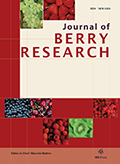Authors: Moya, Mariana | González, Benita | Doll, Ursula | Yuri, José Antonio | Vogel, Hermine
Article Type:
Research Article
Abstract:
Maqui berries are traded internationally for their extraordinary high antioxidant capacity. The traditional wildcrafting is being replaced by cultivated orchards of three selected clones of Aristotelia chilensis , suitable for commercial fruit production. In some shaded areas, low fruit set has been observed, thus the objective of this research was to evaluate the physiological responses to different light conditions in clones ‘Luna Nueva’, ‘Morena’, and ‘Perla Negra’ during two seasons. Plants were established in an experimental design under full sunlight (without cover), black net (50% shade), transparent polycarbonate, and both covers. Number of flowers, fruit, plant height and internode length,
…as well as physiological traits, such as CO2 assimilation and transpiration rates, and water use efficiency were evaluated. The results indicated that quantity and quality of light affect the growth and fruit production in maqui with differences being genotype dependent. In all studied clones, shaded plants (50% of available solar radiation) grew taller and produced less flowers than those exposed to full sunlight. Since clone by cover interactions were significant, specific maqui clones should be recommended for different climate zones: ‘Morena’ seems to be more plastic when exposed to different light conditions than ‘Luna Nueva’ and ‘Perla Negra’.
Show more
Keywords: Light intensity, shade, CO2 assimilation, transpiration rate, photosynthesis, flowering, fruit set, growth, superfruit
DOI: 10.3233/JBR-180377
Citation: Journal of Berry Research,
vol. 9, no. 3, pp. 449-458, 2019
Price: EUR 27.50





